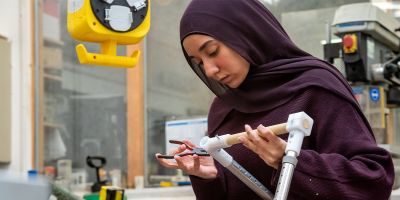Leeds to help UK’s manufacturing revolution with £34.6m robotics hub

The University of Leeds will be a key partner in a national effort to shape the future of British manufacturing through innovative robotics.
A national research hub, which has received £34.6 million in funding through UK Research & Innovation (UKRI), will support the UK’s transition to a circular manufacturing ecosystem. Leeds will be part of a network led by the University of Birmingham that aims to deliver a robotics-enabled sustainable future for the industry.
This newly established EPSRC Manufacturing Research Hub in Robotics, Automation & Smart Machine Enabled Sustainable Circular Manufacturing & Materials (RESCu-M) is a cornerstone of the UKRI’s “manufacturing research hubs for a sustainable future” programme.
RESCu-M is a huge collaborative effort involving partners including Leeds, Strathclyde, Sheffield, Brighton, Loughborough, West Yorkshire Combined Authority, West Midlands Combined Authority, and the Manufacturing Technology Centre. Each one will support the development of “spokes” from the hub, generating new opportunities for further investment.
World-class robotics
Leeds’ fundamental research role at the hub will drive innovation in versatile and cable-integrated robotic systems, which are sustainable with minimum environmental impact. It will also take the lead on building the broader academic community around RESCu-M’s vision to ensure a maximum positive transformation for the UK and long-lasting legacy.
RESCu-M will focus on two major challenges: transforming the sustainable use of critical materials and improving the productivity of “Re-X” manufacturing processes.
Re-X procedures – reuse, repurposing, repairing, remanufacturing, and recycling – are more labour-intensive than traditional manufacturing, meaning valuable materials are often incinerated or sent to landfill. However, UK businesses could save up to £23 billion per year by making low- or no-cost improvements.
The RESCu-M hub will embrace recent developments in AI and intelligent automation to create a new manufacturing ecosystem by leveraging expertise in manufacturing, robotics, AI, materials science, chemical engineering, chemistry, economics and life cycle assessment. It will specifically focus on four key areas: energy, medical devices, electric drives and large structures.
Professor Rob Richardson, Director of the Leeds EPSRC National Facility for Innovative Robotic Systems and a member of the University’s Institute of Design, Robotics and Manufacturing (iDRM), said: “iDRM has sustainability at the centre of all we do as a research institute.
“As a key partner of the RESCu-M hub, we’ll be able to apply our world-class robotic expertise to reduce waste and recover valuable materials for use in the UK economy. We will solve many of the waste problems faced both at home and internationally, and develop technology that gives the UK a true competitive advantage in the field.”
EPSRC executive chair Professor Charlotte Deane said of the funding: “Given the scale and importance of the UK’s manufacturing sector we must ensure that it is able to benefit fully from advances made across the research and innovation ecosystem.
“With their focus on innovation and sustainability the advances made by the hubs will benefit specific sectors, the wider manufacturing sector and economy, as well the environment.”
Andrew Griffith, the Minister of State for Science, Research and Innovation, said: “Manufacturing accounts for almost a tenth of the UK’s economic output, but for the sector to keep growing and sustaining jobs nationwide, it has to tackle challenges ranging from reducing emissions, to cutting production costs.
“These new hubs will support UK researchers with the cutting-edge facilities they need, to help our manufacturers seize the benefits of technologies such as robotics and AI. Harnessing these innovations will cement the UK's position as a global leader in sustainable manufacturing."
Of the £34.6 million raised, £11 million will be provided by the Engineering and Physical Sciences Research Council (EPSRC), while a further £23.6 million was offered by project partners.




